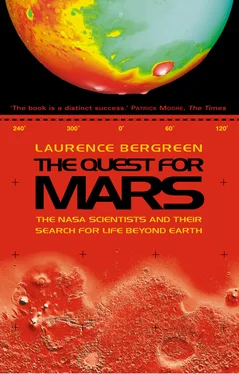The question got me thinking about the famous Miller-Urey experiment designed to illuminate the origins of life. In 1953, two scientists at the University of Chicago, Stanley L. Miller and Harold Urey, put gaseous methane, ammonia, water vapor, and liquid water – ingredients thought to simulate a primitive Earth atmosphere – into a closed system, and sent an electrical discharge spark through the mixture. The gases interacted, and a gummy residue formed; analysis showed it contained organic molecules, including many amino acids, which are the building blocks of life. It had been previously thought that the prerequisites for life were rather special and demanding and occurred only on Earth, but the experiment suggested that all you needed to produce life were a few simple, readily available chemicals and an energy source. These things could be found on other planets, on some asteroids, and most probably on Mars. You don’t need oxygen for life to develop, and you don’t even need the Sun; the heat source could be volcanic or subterranean. I asked Jim, “If you put together all the necessary ingredients, does life inevitably develop?” Because if it did, it could be developing on Mars and throughout the universe, wherever those things are found.
“Larry,” he said, “you’ve just asked the Genesis Question. We don’t know the answer. Some people believe it could, some believe it couldn’t. A few billion years ago in the history of this planet, and in the history of Mars, and possibly in the history of other places, there may have been very sporadic conditions that might have been able to sustain life. But that was at the time when the planets were being constantly bombarded by junk leftover from when the Solar System formed. There was a lot of leftover crap, and it eventually smashed into the planets. We think all the planets formed about four point seven billion years ago in a relatively commonplace little spinning nebula of dust that collapsed to produce them and also spun off stuff that didn’t quite make it, like the materials in the asteroid belt that occasionally crash into us.” And then he said: “There was even an idea that life sprang forth on those objects, and there was a great so-called ‘panspermia’ wherein life spread from one place to another from some unknown source. Not us. We weren’t the source, according to panspermia theory. We were just one of the places where it landed and survived.”
I casually remarked that panspermia sounded like the answer to the question of life in the universe.
“Be careful,” Jim said. “The idea is very controversial, and often misunderstood. A lot depends on whom you talk to.” Although there is no consensus about life on Mars now, he told me, many scientists have come to believe that it’s very hard to imagine that Mars didn’t have a failed attempt at life forms at some point in its history. “The question is: where did it go? Seeing the existence of life on Mars would be like finding the Rosetta Stone. We may be alone now , but not in the past.” Jim thinks of Mars as the mother of all control experiments. “The theory goes like this: the Earth is a very messy, complicated, intersecting set of systems, but we also need a sandbox to play in, and the best sandbox we have is Mars. It’s a natural control experiment for things we want to understand about our own planet, if we were able to strip away and isolate some of the variables. For instance, Mars is colder and drier. Water exists there as ice or as a gas in the atmosphere. When it did exist as a liquid, it probably did so only briefly. There is no biosphere altering the planet, as we have on Earth. If it ever started, it failed.”
It’s possible that we could end up like Mars, as the Sun fades. Jim tells me that if all the water on Earth froze and then evaporated, we could very well have conditions that would suck the oxygen out of our atmosphere without renewing it.
I begin to think of Mars as Earth reduced to the essentials. For purposes of scientific research, it’s more promising than the moon, even though it is much harder to reach. “Back in the days of Apollo, we could use military-class technology to zip up to the moon and fly around and be very clever because we had unlimited funds and a national commitment from our president to put human beings there. We don’t have that commitment for Mars,” Jim reminds me, making the idea of regular transits to Mars suddenly sound sensible. “People argue that NASA will never have carte blanche like that again. Nowadays, you have to keep the price way down. It means that when you go to Mars you can’t carry enough fuel to go into the orbit you want. You have to use the gravity and atmosphere of Mars itself to get you there.”
Jim takes heart from historical precedents for these difficulties. “Think of them in terms of the exploration of our own planet,” he says. “Think of the early sailors willing to risk their lives sailing from Greece to Crete, an island about a day away, if the wind blows right. They might be willing to do that because, what the heck? That’s analogous to going to the moon, which we can reach in a matter of a few days. Now imagine sailing not from Greece to Crete but from Greece to North America. That’s the scale of difference we’re talking about when we send spacecraft out to Mars.” At that scale, the celestial sailors will have to learn to improvise in order to survive, just their maritime forebears did.
While we linger at the seep, Jim reminds me that only thirty-five years ago, there was nothing here but the Atlantic Ocean and fresh air. And now we are standing on rock containing copious evidence of bacteria. Could life have spread as quickly on a Martian volcano? Well, why not? No one knows. Questions like these form the basis for “astrobiology,” the search for extraterrestrial life – generally in the form of primitive bacteria invisible to the naked eye. Although the questions posed by astrobiology – or, as it is sometimes called, exobiology – have concerned NASA scientists for over twenty years, the field has suddenly entered a period of rapid expansion, as it moves from the realm of the purely speculative to the potentially demonstrable.
Biologists are coming around to the idea that Earth, while complex and idiosyncratic, is hardly unique. Our planet does not necessarily contain a divine, magical, or fluke recipe for life. On the contrary, life emerged here when our planet was less than a billion years old, as the outcome of geologic and chemical processes. It might have been the inevitable outcome; if so, it could easily appear throughout the Solar System and the universe.
In that case, why has extraterrestrial life been so hard to find? One thing is now clear to many scientists. As the song goes, they’ve been looking for life in all the wrong places – mainly in moderate, sunlit, moist environments. As biologists develop a greater understanding of all the unlikely, remote places where life exists on Earth, it has become apparent that there is much greater latitude. Life forms can be so hardy and unpredictable that they will find a way to exist just about anywhere. And at the microbial level, life can be so simple it seems barely alive at all. Still, to qualify as life, the stuff has to satisfy at least two widely accepted conditions. It must be able to replicate, and it must be able to mutate and evolve. Darwin’s principles of natural selection apply at all levels of life, and if life is discovered on Mars, or anywhere else in the universe, natural selection will apply there, as well.
We make our way along shallow erosional gullies, which provide a foothold on the volcano’s sheer upper reaches, until we arrive at the summit of Surtsey, a precarious location high above the surface of the North Atlantic. Jim, who’s lighter and more agile, is a lot better adapted to climbing than I. The jet lag and lack of sleep are taking their toll; my heart thumps wildly, and the wind pushes me off balance. I look up, trying to orient myself. Heimaey, so solid and inviting by comparison, floats in the distance, and beyond, Iceland itself. After a brief rest, we head down the steep slope.
Читать дальше












